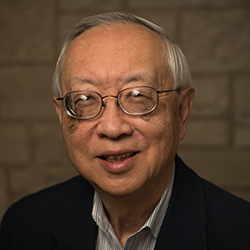Robert Chang Looks Back on Career at Northwestern Engineering
Mentoring and guiding students brings the professor emeritus pride
Robert Chang accomplished a lot at Northwestern Engineering. Yet there is one achievement that brings him the most pride: mentoring students.
Chang has become a Professor Emeritus of Materials Science and Engineering. Following 15 years on the technical staff at AT&T Bell Labs, Chang arrived at Northwestern University in 1986 as a professor of materials science and engineering and electrical engineering and computer science. He has been honored for his contributions to plasma science and technology, diamond research, high-temperature superconductivity, and carbon nanotubes. Chang’s research interests include photonic crystals, amorphous semiconducting oxide films, solar cell design and fabrication, and nanostructured materials.

During his time at the University, Chang contributed to the McCormick School of Engineering’s growth, and touched the lives of so many he taught.
“Guiding students to chart a course for their lives is what I’ll remember most,” Chang said.
Chang’s impact on the McCormick community will be felt years from now. In addition to his research, he contributed to and created several innovative educational programs, including ones that particularly targeted K-12 STEM education. Those initiatives included launching the first National Science Foundation (NSF) Research Experience for Teachers Program in 1993, as well as the Materials World Modules program for middle and high school students around the country. In 2005, Chang was honored by the NSF as the Director's Distinguished Teaching Scholar for achieving groundbreaking results in research, strong teaching and mentoring skills, and major educational contributions.
Chang served as director of the Northwestern University Materials Research Center, and the National Center for Learning and Teaching in Nanoscale Science and Technology, as the president of the Materials Research Society (1989), and as a general secretary and president of the International Union of Materials Research Societies (IUMRS). He led the Materials Research Institute at Northwestern University, and was a member of advisory boards of the National Institute for Materials Science and of the journal Science and Technology of Advanced Materials.
“Those programs helped students gain a global perspective,” Chang said. “Not only do they have a global impact, but they also provide a good outlook for the students and my peers, and all help to provide a larger perspective regarding global interactions in materials.”
Chang felt it was especially important to initiate K-12 outreach.
“I wanted to give young students an early understanding of the importance of materials science and its impact to society,” Chang said.
